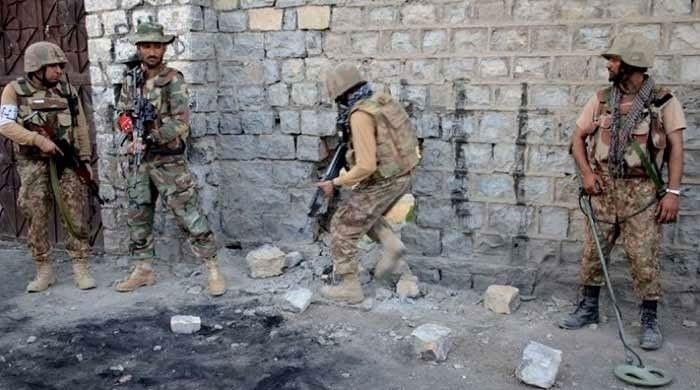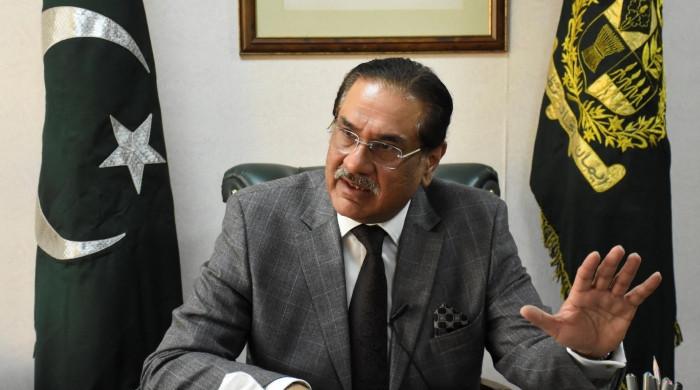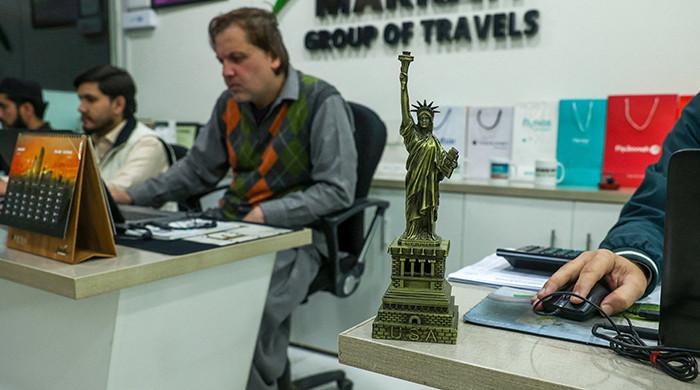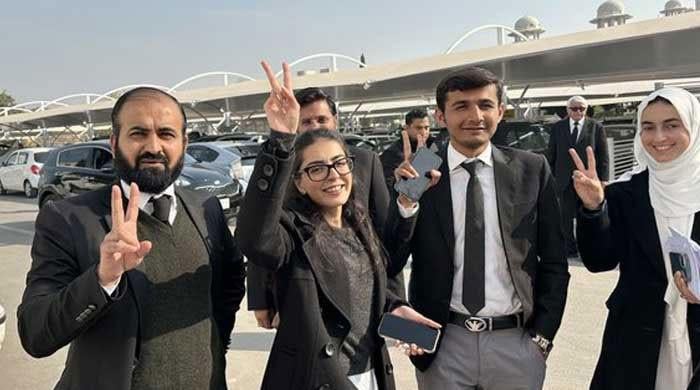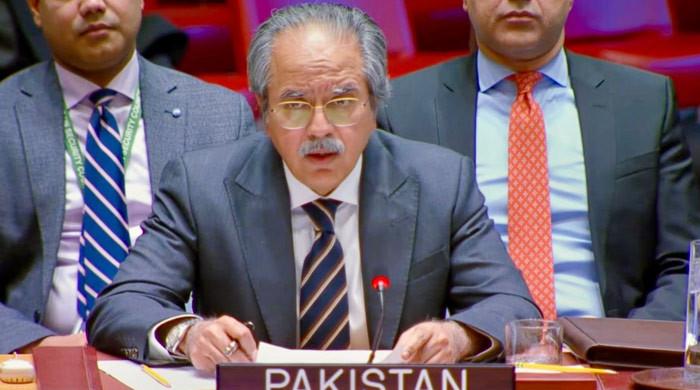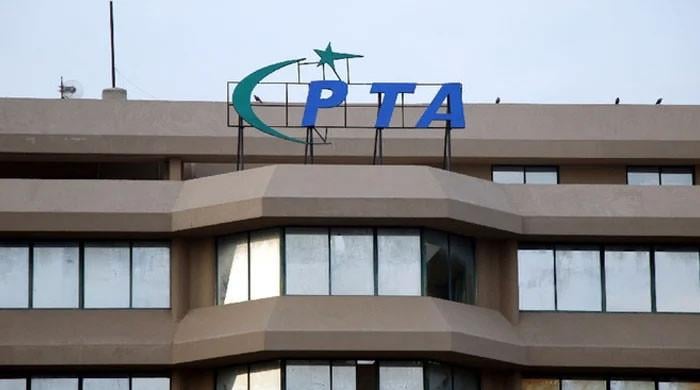Constitutional order above NA rules: CJP
The counsels of the remaining respondents will present their arguments tomorrow at 11am
April 05, 2022
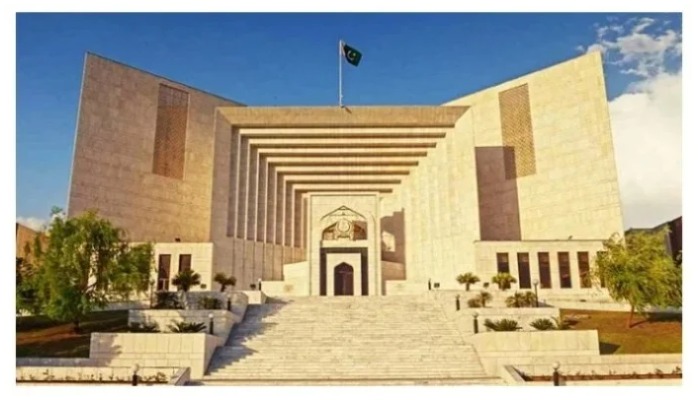
- CJP Umar Ata Bandial says apex court will announce decision after hearing all respondents.
- Says speaker can’t reject no-trust motion even if he refers to Article 5.
- SC took suo motu notice of constitutional crisis that erupted after no-trust motion against PM Imran Khan was deemed "unconstitutional."
ISLAMABAD: The Chief Justice of Pakistan Umar Ata Bandial on Tuesday said that constitutional orders are above the rules of the national assembly.
His remarks came during the hearing of the case filed against the "unconstitutional act" of the National Assembly Deputy Speaker Qasim Suri, who had disallowed the vote of no-confidence against Prime Minister Imran Khan on Sunday — a move that the Opposition said was a blatant violation of the Constitution.
A five-member larger bench of the apex court, headed by Justice Bandial and comprising Justice Muneeb Akhtar, Justice Aijazul Ahsan, Justice Mazhar Alam, and Justice Jamal Khan Mandokhel resumed the hearing this afternoon.
During the hearing, CJP Bandial directed NA speaker's counsel Naeem Bokhari to present the minutes of the crucial NA session held on March 31 to debate the no-confidence motion against Prime Minister Imran Khan.
The CJP also directed Bokhari to assist the court with the help of documents in the next hearing over the question of whether Suri had been given the authority to give the ruling or not.
During the hearing, PML-N's counsel Makhdoom Ali Khan said that the apex court can take an in-camera briefing from the premier intelligence agency chief.
"SC does not practice interference in foreign policy or state policy affairs. It would be easier for us if the case is examined in the light of law and Constitution instead of policy issues," CJP Bandial remarked in response to Khan's suggestion.
CJP remarked that the majority (20%) of the members were present in the NA when the no-confidence motion against PM Imran Khan was tabled.
"The Constitutional right cannot be disregarded based on NA Rules."
At the outset of the hearing, PPP Senator Raza Rabbani walked to the rostrum to present his arguments.
"This is a civilian coup. A stance was created through an alleged cable which is based on malafide intent," the Senator said, adding that the no-confidence motion against the prime minister was tabled on March 28 but the NA session was adjourned.
He maintained that Suri gave the ruling without putting the documents before the Parliament on Sunday.
He argued that Rule 28 says the deputy speaker cannot give a ruling even if he has the authority.
"Deputy speaker's ruling is illegal [...] no-trust motion cannot be rejected without voting on it," Rabbani said.
He further stated that the deputy speaker's ruling doesn't have constitutional security under Article 69.
"Voting is mandatory within the given duration as per the Constitution”.
PPP's counsel said that the no-trust motion cannot be rejected under the Constitution.
"It can be dismissed only when if those who submitted it take it back and the speaker can reject it only after voting is held on it."
Rabbani went on to say that President Arif Alvi didn't need to file the reference seeking interpretation of Article 63A. Instead, he should have advised the prime minister to go for voting on the motion filed against him.
Rabbani requested the court to seek the minutes of the National Security Committee meeting and details of the cable.
He also requested to form a judicial commission to probe into NA proceedings and asked for a stay on Sunday's assembly session case.
"The court should consider the misuse of authority instead of the proceedings within the assembly and see whether the speaker can apply Article 5."
Rabbani concluded his arguments by saying that they want that the arguments to be completed and the court issues a brief order today.
"[We] will release an order if all the parties complete the arguments," the chief justice said in response.
The court adjourned the hearing of the case till 11:30am tomorrow (Wednesday). The counsels of the remaining respondents will present their arguments tomorrow.
PML-N's counsel presents arguments
After Rabbani, PML-N's counsel Makhdoom Ali Khan presented his arguments before the court.
Khan started his arguments by asking the court to declare the ruling of the NA deputy speaker null and void and restore the assemblies.
He narrated the NA's proceedings of March 28 when the leader of the Opposition Shahbaz Sharif was allowed to table the no-trust resolution against PM Imran Khan.
"On that day, the session was adjourned till March 31," Khan said, adding that according to Rule 37, the debate on the no-confidence motion had to take place on that day only but it didn't happen.
He asked if Suri, as the deputy speaker, had the authority to dismiss the resolution in this way.
"The entire case is based on the question of whether the deputy speaker can give such a ruling," he added.
Khan contended that the majority of the MNAs supported the resolution of no-confidence against PM Imran Khan as 161 lawmakers favoured it.
Moreover, he said that the session couldn't be further adjourned after a motion of no-confidence is filed against NA Speaker Asad Qaiser.
Justice Akhtar inquired if Article 69 encompasses the NA Rules regarding the authorities of the speaker.
At this, Khan said that NA Rules for running the assembly affairs and no rule contradicts the method stated under Article 95.
Justice Akhtar inquired if Articles 91 and 95 give the speaker constitutional security over the procedural defect.
Khan responded to the query by saying that the deputy speaker doesn't have the authority to reject the no-trust motion therefore Suri has committed Constitutional manipulation.
"The Constitution is silent on the procedure of submitting a no-confidence motion," Justice Akhtar remarked.
He asked if the speaker loses authority after a motion of no-confidence bearing support of 20% MNAs is filed and he could only hold polls on the motion after that.
At this, Khan replied that Article 95 doesn't apply if it is assumed that no member supports the prime minister except for the speaker.
The PML-N counsel maintained that the speaker's ruling is unconstitutional as it is against Article 95, therefore it can be reviewed.
"Only the House can decide if the prime minister can continue to serve his post or not."
Justice Mandokhel inquired if the court can review the ruling passed by a deputy speaker.
"Can a judicial review reverse the speaker's ruling or investigate the illegal acts regarding the no-confidence motion," he asked.
To this, Khan responded positively saying that the apex court can review an unconstitutional ruling and nullify it.
At this, Justice Akhtar inquired: "Does the Constitution say that the SC can issue a verdict on every illegal act committed within the Parliament?"
"You are opening the doors of court for the Parliament's proceedings after which the court will have the authority to interfere in the Parliament's affairs over petty issues. There will be piles of cases if the apex court started ruling out the NA proceedings or rulings," he added.
Speaker can’t reject no-trust motion even if he refers to Article 5: CJP
On Monday, the apex court heard the arguments by PPP's counsel Farooq H Naek who contended that Suri's ruling in Sunday's session was meant to deliberately avoid the voting process in the Assembly.
During the hearing, CJP Bandial directed Naek to argue how the deputy speaker's ruling is illegitimate.
The CJP asked how the speaker could give a ruling on whether the motion was legal or illegal. "Does the speaker have no authority to reject the no-confidence motion?" he asked.
"Even if the speaker cites Article 5 of the Constitution, the no-confidence motion cannot be rejected," the CJP said.
The CJP then asked to what extent does the speaker have constitutional protection under Article 69? "We want to make a decision sooner than you," he said.
Naek requested the court to wrap up the case and reserve the verdict.
However, the CJP remarked that the court has to hear other respondents as well. After this, the court adjourned the hearing till today.
SC takes suo motu notice
CJP Bandial had taken a suo motu notice of the constitutional crisis that erupted after the incident. CJP Bandial maintained in a written judgment issued during Sunday's hearing that his fellow judges had approached him and had expressed concern over the situation.
"Any orders and actions that Prime Minister Imran Khan and President Arif Alvi regarding the dissolution of the National Assembly shall be subject to the order of this court," CJP Bandial had said taking the notice on Sunday.
Earlier, the SC restrained state institutions from taking any extra-constitutional steps and directed them to act strictly in accordance with the Constitution, besides asking all political forces of the country to remain peaceful.
Opposition's petition
The joint Opposition has also prepared a petition to cancel the ruling of the deputy speakers under which the National Assembly session was adjourned for an indefinite period as Suri cancelled the voting on the no-confidence motion, terming it “unconstitutional”.
According to the petition prepared by the joint Opposition, the speaker should be directed to convene the session today as “the deputy speaker cannot adjourn the session as it is unconstitutional.”
Furthermore, the Opposition has filed a petition against President Arif Alvi, PM Imran Khan, Speaker NA Asad Qaiser and Deputy Speaker Qasim Suri for violating the Constitution.
SCBA's petition
Meanwhile, Supreme Court Bar Association (SCBA) has also filed a petition in the Supreme Court on the constitutional crisis.
The constitutional petition filed by SCBA states that a voting of no-confidence motion was a must, and the speaker cannot cancel the voting by a ruling.
It was further noted that the deputy speaker’s ruling contradicts Article 95(2). It further said that according to Article 58(1) the premier cannot even “advise dissolution of the assembly,” once the no-confidence motion is filed against him/her.
Sources privy to the matter said that a special bench of the top court will hear the case.




